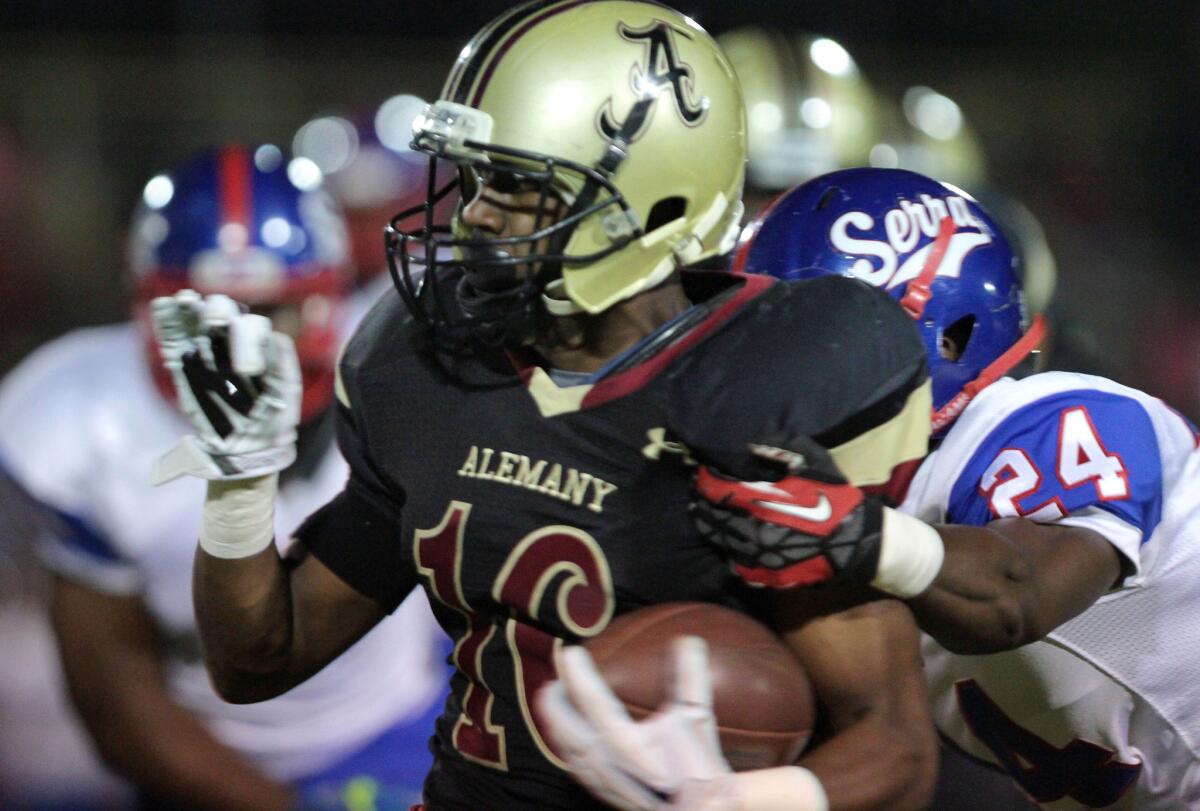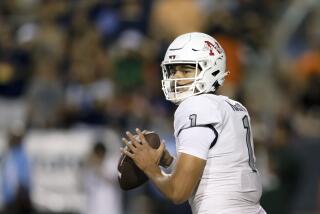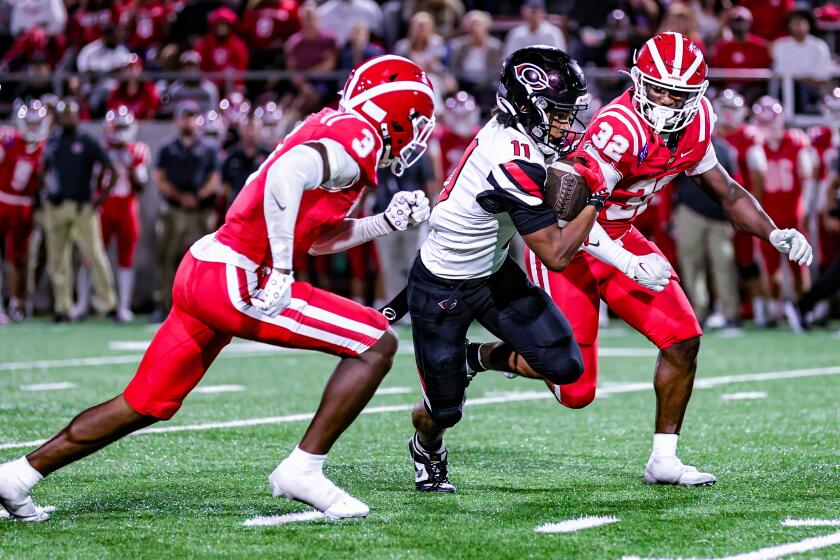College football could be headed to an early-signing period

Defensive lineman Jacob Daniel made a verbal commitment to USC last May. Dominic Davis, a running back and receiver, committed in October.
Like all high school seniors with football scholarship offers, they cannot sign national letters of intent until the first Wednesday in February, commonly known as national signing day.
But that timetable could change if a proposal is adopted this summer by the Conference Commissioners Assn., which includes representatives from 32 college conferences.
A 12-member study committee of conference administrators, athletic directors and former coaches is recommending that football follow the lead of most other NCAA sports and consider adopting an early-signing period. If approved, it would become effective later this year.
“I think there is support for this,” said Mid-American Conference Commissioner Jon Steinbrecher, who chaired the committee. “The drum on this has been beating for a long time.”
The proposed three-day early-signing period would begin the third Wednesday in December, aligning with a current period for junior college players.
Steinbrecher said more than 1,400 freshman football players responded to a survey that revealed that 82% had verbally committed to a school before their senior seasons, and that more than 90% signed with the schools they had committed to.
The February signing date would still be available for players who wanted more time, he said, and there would be no change in the recruiting “calendar,” in which the NCAA mandates quiet, evaluation, contact and dead periods.
Daniel, who attends Fresno Clovis North High, said he would “totally favor” an early-signing period.
The opportunity, he said, would eliminate “the floppiness” of players changing their commitments at the last moment. It would also stop coaches at other schools from continuing to recruit committed players into February.
“It got a little bit annoying after awhile,” Daniel said of his experience, “but they’re just doing their job.”
Davis, who attends Mission Hills Alemany, committed to Washington State in July but switched to USC in October.
He favors an early-signing period. “You would know for sure the college you’re going to and there wouldn’t be any problems,” he said.
USC on Tuesday is expected to sign its first full 25-player recruiting class in four years. Kicker Matt Boermeester, who was awarded a scholarship in training camp last year, counts against this year’s class. Five players who signed financial-aid agreements are already enrolled and will participate in spring practice. Daniel and Davis are among 16 players who have made verbal commitments. The Trojans are going down to the wire with several prospects for the remaining scholarships.
USC Coach Steve Sarkisian said he does not have strong feelings one way or the other regarding an early-signing period and that his staff was prepared to operate under any system. But he allowed that an early-signing period would probably eliminate the need to continually track each player in a signing class all the way up to the February signing day.
“If half were already done, we could focus our attention on the remaining the spots,” he said.
Two players who signed financial-aid agreements with UCLA are already enrolled in Westwood. The Bruins have verbal commitments from 15 others.
UCLA Coach Jim Mora said he had no opinion on the issue of an early-signing date. “My focus is on this recruiting period,” he said.
Greg Biggins, national recruiting analyst for Fox Sports and Scout, said an early-signing period would benefit college coaches immensely because they no longer would be required to “babysit” committed players through February, allowing them to focus exclusively on pursuing uncommitted and unsigned prospects during the final weeks of the recruiting cycle. But the early-signing opportunity could have disadvantages for a player, he said.
“He will be pressured,” to sign in December, Biggins said, and — depending on how highly he is regarded as a prospect — might fall out of favor with the coaching staff or lose his spot to another player if he does not formalize his commitment.
Also, a player who signs with a mid-major school might miss the opportunity for a late offer from a more prominent school, he said.
Scott Altenberg, coach at Gardena Serra High, said he would “love” to see an early-signing period implemented, but would prefer that it was before a player’s senior season.
“It would take so much pressure off these kids,” he said.
Crenshaw Coach Robert Garrett favors the February date because it gives players and families, especially those going through the process for the first time, “leeway and flexibility as to whether this is exactly what they want to do.”
But Davis, who is eager to graduate and begin working out with new college teammates, said most players would prefer to complete the process as soon as possible.
“Better early than late,” he said.
Follow Gary Klein on Twitter @latimesklein
Times staff writer Chris Foster contributed to this report.
More to Read
Go beyond the scoreboard
Get the latest on L.A.'s teams in the daily Sports Report newsletter.
You may occasionally receive promotional content from the Los Angeles Times.











